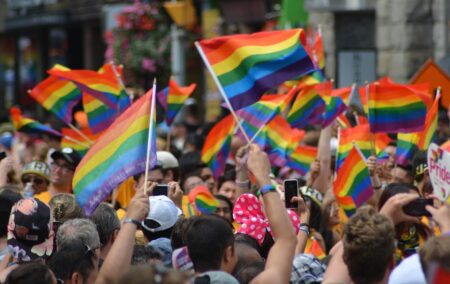Rights for LGBTQ people have been advanced by two key decisions in the United States and Gabon, which signal continuing, if slow, progress for the widely persecuted community.
Both came as the LGBTQ community celebrated Pride Month in June. Though many Pride marches around the world were postponed because of the Covid-19 pandemic, a ruling of the United States (US) Supreme Court and a decision by legislators in Gabon have been noted as significant advances for a community that routinely confronts injustice and the denial of human rights.
In the first victory, the US Supreme Court ruled that a landmark civil rights law protects gay, lesbian and transgender people from discrimination in employment.
The court decided by a 6-3 vote that a key provision of the Civil Rights Act of 1964, known as Title VII, that bars job discrimination on the grounds of sex, among others, encompasses bias against LGBTQ workers.
Justice Neil Gorsuch wrote in the judgment: ‘An employer who fires an individual for being homosexual or transgender fires that person for traits or actions it would not have questioned in members of a different sex. ‘Sex plays a necessary and undisguisable role in the decision, [which is] exactly what Title VII forbids.’
IRR analysts point out that the ruling illustrates how existing legislation can be used to further LGBTQ equality. For example, Botswana’s High Court in 2019 scrapped laws criminalising homosexuality based on a similar approach. In the past, Botswana’s main LGBTQ organisation, Lesbians, Gays and Bisexuals of Botswana, took steps to ‘test’ the courts on where they stood on LGBTQ rights and how they interpreted the law. It was eventually concluded that the ‘crime’ was sodomy, not homosexuality. LGBTQ people could thus be protected under the rights of freedom of association and freedom of expression. This set the foundation upon which the decriminalisation case was built in Botswana. Using existing legislation to further LGBTQ rights proved much easier than attempting to build a case from scratch.
The second victory for the LGBTQ community occurred in Gabon when lawmakers voted to reverse one-year-old legislation outlawing homosexuality.
Until recently, same-sex relationships were not criminalised in Gabon. That changed in July 2019, when an anti-gay provision was adopted. It provided for punishment of homosexuality with up to six months in prison and a fine of 5 million CFA francs (US$8,521). However, last week, 48 MPs in the National Assembly voted in favour of a government-backed bill to repeal the 2019 provision banning consensual ‘sexual relations between people of the same sex’. Twenty-four voted against, while 25 abstained.
The significance of the decision is borne out by the fact that Gabon is ranked as one of the most homophobic regions in the world. Afrobarometer, which regularly conducts attitude surveys across the continent, reported that only a fifth of Africans express high tolerance for LGBTQ individuals.
However, IRR analysts believe the development in both the US and Gabon are indications of a world waking up to the gross injustices that LGBTQ people suffer daily.

